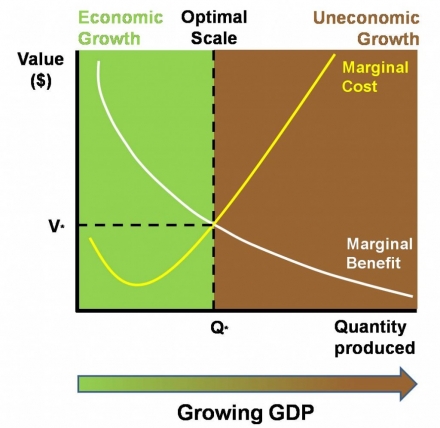Cross-posted from the website of the Center for the Advancement of the Steady-State Economy (CASSE).
There is a Conflict between Economic Growth and:
(1) Environmental Protection
A growing economy consumes natural resources and produces wastes. It results in biodiversity loss, air and water pollution, climate destabilization, and other major environmental threats.
(2) Economic Sustainability
A healthy environment is the foundation of a healthy economy. We need healthy soils for agriculture, healthy forests for timber, and healthy oceans for fisheries. Along with clean air for breathing and clean water for drinking, these are the building blocks of a prosperous economy and a good life.
(3) National Security and International Stability
When economic growth threatens the environment and economic sustainability, social unrest is the result, and national security is compromised. Economic growth was once used for building military power, but in an overgrown global economy, economic sustainability is more conducive to diplomacy and stability among nations.
Evidence of the Conflict
The conflict between economic growth and environmental protection is becoming more apparent as the oversized economy bumps up against limits. From depletion of ocean fisheries to loss of pollinators, from groundwater drawdown to deforestation, from climate change to increasing concentrations of toxic pollution (not to mention increasing childhood cancer rates), from massive urban slums to degraded rural lands, the consequences of too much economic growth are observable all around us.
Ecological footprint analysis also reveals that the economy has become overgrown. The footprint measures how much land and water area a human population requires to produce the resources it consumes and to absorb its wastes under prevailing technology. According to data from the Global Footprint Network, the footprint of all nations exceeded the biological capacity of the planet in the mid- to late 1980s. We find ourselves in a global state of overshoot, accumulating ecological debt by depleting natural capital to keep the economy growing.
Uneconomic Growth
Continuing to grow the economy when the costs are higher than the benefits is actually uneconomic growth. The United Nations has classified five types of uneconomic growth:
* jobless growth, where the economy grows, but does not expand opportunities for employment;
* ruthless growth, where the proceeds of economic growth mostly benefit the rich;
* voiceless growth, where economic growth is not accompanied by extension of democracy or empowerment;
* rootless growth, where economic growth squashes people’s cultural identity; and
* futureless growth, where the present generation squanders resources needed by future generations.
The downsides of economic growth can be avoided by maintaining an optimal scale of the economy.
Marginal cost refers to the cost of producing one more unit of a good or service. Marginal benefit is the benefit gained from one more unit. This graph shows the marginal costs and benefits of GDP growth. Costs tend to rise and benefits tend to decrease for each additional unit of growth. We should stop growing GDP, therefore, when marginal costs are exactly equal to marginal benefits. If costs are less than benefits, then GDP growth is economic (the green part of the graph). When costs rise above benefits, GDP growth is uneconomic (the brown part).
The mission of CASSE is to advance the steady state economy, with stabilized population and consumption, as a policy goal with widespread public support. We pursue this mission by:
* educating citizens, organizations, and policy makers on the conflict between economic growth and (1) environmental protection, (2) ecological and economic sustainability, and (3) national security and international stability;
* promoting the steady state economy as a desirable alternative to economic growth;
* studying the means to establish a steady state economy.
This work is licensed under a Creative Commons License 
Tags: consumption, ecological economics, economic growth, economics, environment, environmental protection, Food for Thought, national security, policy, sustainability, sustainable development


